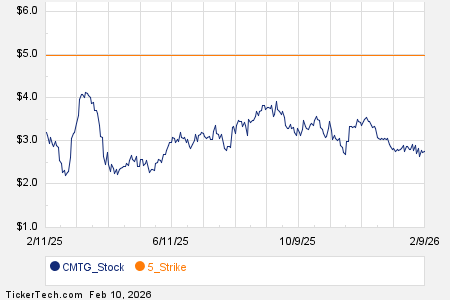Can Lumen’s New Deal with Microsoft Spark a Lasting Turnaround?
In previous years, Microsoft (NASDAQ: MSFT) and Lumen (NYSE: LUMN), the telecom company formerly known as CenturyLink, did not often cross paths in discussions. Microsoft was known for rapid growth in tech areas like cloud services, mobile applications, AI, and gaming. In contrast, Lumen struggled in the declining wireline market and failed to focus on more promising wireless opportunities.
By June, Lumen’s stock fell below $1, marking a staggering decline of over 95% from its peak in 2014. However, in July, the narrative shifted. Lumen secured a new networking and fiber deal with Microsoft’s Azure, which is the second-largest cloud infrastructure platform worldwide. This partnership fueled investor excitement, and Lumen’s stock rallied back up to $6.

Image source: Getty Images.
Interestingly, investors who bought Lumen’s stock at its low of $1 have seen better returns than those who invested in Microsoft over the last four months. Yet, the question remains: Can Lumen sustain this upward trajectory moving forward?
Lumen’s Future Rides on AI Infrastructure Projects
For five years, Lumen has faced revenue declines, and it was unprofitable over the last two years, even suspending its dividend in 2022. This downturn primarily stemmed from struggles in the wireline sector, overshadowing growth in its fiber business, along with sales from cloud services, security, and collaboration offerings.
Strikingly, Lumen’s focus on business wireline connections positioned it as an important ally for Microsoft, which requires an expanded data center infrastructure to support its burgeoning ecosystem of services related to cloud, mobile, and AI technologies. Consequently, Microsoft’s growth factors could offer significant benefits for Lumen’s wireline segment.
Before Microsoft’s intervention, Lumen was in dire straits. It reported a negative free cash flow (FCF) of $878 million by the end of 2023 and continued to bear $18.4 billion in long-term debt with a high debt-to-equity ratio of 70. Analysts predict an 11% decline in revenue for 2024, bringing it to $13 billion, alongside an estimated net loss of $252 million.
However, in early August, Lumen announced it had secured $5 billion in new business, including its Azure contract, in the AI connectivity market. They also revealed ongoing discussions aimed at potentially securing another $7 billion in sales and plan to more than double their intercity network mileage over five years. These contracts could boost Lumen’s annual FCF to a positive range of $1 billion to $1.2 billion in 2024.
Based on Lumen’s projections, it could generate revenues between $5 billion and $12 billion over the next five years from these AI-related contracts. This range could represent about 7% to 16% of estimated revenue in 2023, though uncertainty looms about whether these new opportunities can counteract declines in its traditional wireline business.
Despite the optimism, analysts remain skeptical, forecasting continued revenue drops for Lumen into 2025 and 2026. With an enterprise value of $23 billion, Lumen’s stock appears reasonably priced at less than two times this year’s sales.
Long-term Prospects Favor Microsoft
While Lumen has recently outperformed Microsoft, its comeback is heavily linked to the Azure deal, which helped avoid a potential delisting. Maintaining this momentum could be challenging if new AI contracts fail to deliver expected results.
Meanwhile, Microsoft continues to shine, focusing on expanding its cloud, mobile, and AI capabilities. Under the leadership of CEO Satya Nadella since 2014, Microsoft has transformed its productivity software into robust cloud offerings, expanded Azure, invested in OpenAI (the creator of ChatGPT), and integrated AI tools into its products. The company has also broadened its gaming offerings and launched new hardware.
These efforts explain Microsoft’s compound annual growth rate (CAGR) of 11% in revenue from fiscal 2014 to fiscal 2024, with earnings per share (EPS) growing at a CAGR of 16%. For fiscal 2025, analysts expect revenue and EPS growth rates of 14% and 11%, respectively.
Such robust growth figures indicate Microsoft has significant growth potential left. However, with a market cap of $3.1 trillion, it ranks as the third-most valuable company globally, and its stock trades at 32 times forward earnings. Consequently, much of its anticipated growth is already reflected in its stock price, suggesting it may plateau until profits align with valuations. Any setbacks with Azure, its key growth driver, could restrain its upside.
Therefore, purchasing Microsoft as a long-term investment in AI seems more prudent than betting on Lumen. Despite Lumen’s potential for short-term growth, the high costs associated with its AI connectivity projects may hinder long-term profitability.
Seize the Opportunity for Potential Gains
Have you ever felt you missed out on investing in top-performing stocks? If so, you should pay attention now.
Occasionally, our expert analysts issue a “Double Down” stock recommendation, identifying companies poised for rapid growth. If you fear you’ve already lost your chance, this may be the ideal moment to invest—before it’s too late. Consider the following:
- Amazon: if you invested $1,000 when we doubled down in 2010, you’d have $21,285!*
- Apple: if you invested $1,000 when we doubled down in 2008, you’d have $44,456!*
- Netflix: if you invested $1,000 when we doubled down in 2004, you’d have $411,959!*
Currently, we’re issuing “Double Down” alerts for three exceptional companies—don’t miss the chance!
See 3 “Double Down” stocks »
*Stock Advisor returns as of October 21, 2024
Leo Sun has no position in any of the stocks mentioned. The Motley Fool has positions in and recommends Microsoft. The Motley Fool recommends the following options: long January 2026 $395 calls on Microsoft and short January 2026 $405 calls on Microsoft. The Motley Fool has a disclosure policy.
The views and opinions expressed herein are the views and opinions of the author and do not necessarily reflect those of Nasdaq, Inc.






